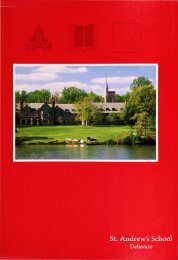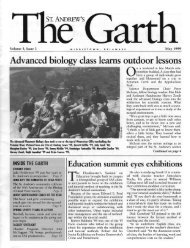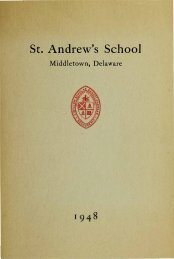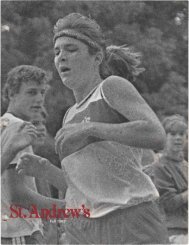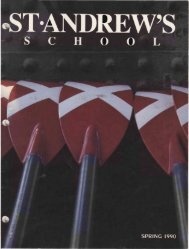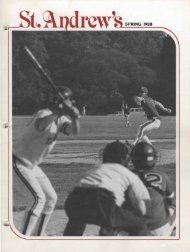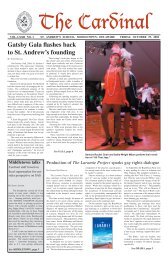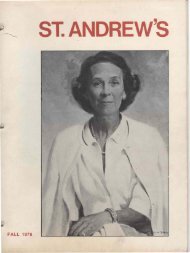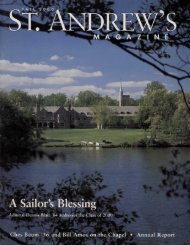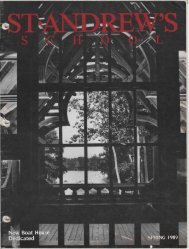Untitled - Saint Andrew's School Archive - St. Andrew's School
Untitled - Saint Andrew's School Archive - St. Andrew's School
Untitled - Saint Andrew's School Archive - St. Andrew's School
You also want an ePaper? Increase the reach of your titles
YUMPU automatically turns print PDFs into web optimized ePapers that Google loves.
ENGLISH<br />
The English department beieves<br />
that the ability to<br />
think, write and speak<br />
clearly, logically and articulately<br />
is necessary not only for a <strong>St</strong>.<br />
<strong>Andrew's</strong> diploma, but also as a<br />
foundation for a successful career<br />
in college and in life. To this end<br />
we root our classes in the training<br />
of perceptive reading, the exercise<br />
of concise writing, and the practice<br />
of coherent debate, fostering in the<br />
student an appreciation for great<br />
and powerful literature, and for his<br />
or her own written and spoken<br />
expression.<br />
An English course at <strong>St</strong>. <strong>Andrew's</strong><br />
will not just instruct reading, writing<br />
and oral skills: it will be an experience<br />
in, of, and about the human<br />
condition, about the questions and<br />
visions and values of other human<br />
beings. The situations, confrontations,<br />
and struggles within Julius<br />
Caesar, Huckleberry Finn, Light in August<br />
and To the Lighthouse allow the<br />
student to evaluate his or her own<br />
concept of the "common humanity."<br />
We believe very strongly that the<br />
literature studied should reflect the<br />
broad cultural diversity of our society<br />
and of our students; therefore,<br />
each class reads works of and by both<br />
men and women, blacks and whites,<br />
Americans and non-Americans.<br />
The program of writing and reading<br />
gradually builds from the lower<br />
forms to the senior year. In the III<br />
Form the emphasis is placed on<br />
small, concise writing assignments;<br />
in English IV, the student concentrates<br />
on multiple-paragraph, short<br />
essays, experimenting with a variety<br />
of styles, including both analytical<br />
and creative assignments; in English<br />
V and VI, students work on analytical<br />
assignments that can be either<br />
formal or creative in approach. In<br />
the lower forms, a great deal of class<br />
time is spent on prewriting, writing<br />
opening sentences, paragraph development,<br />
revision and editing, grammar,<br />
vocabulary, and style; in the<br />
upper forms, the student is expected<br />
to work on his or her own. Journals<br />
and oral presentations allow students<br />
to respond personally and<br />
immediately to what they read. Additionally,<br />
oral presentations build<br />
confidence and give the student<br />
greater responsibility and partnership<br />
in the teaching and tone of the<br />
classroom. The overall aim is to<br />
promote focused and lucid thought<br />
and to convey it through organized<br />
and effective prose and speech. We<br />
also believe in collaborative learning.<br />
<strong>St</strong>udents often work in groups,<br />
engage in peer criticism of writing,<br />
and produce and critique scenes<br />
from plays.<br />
Similarly, the literature explored<br />
grows more demanding through the<br />
forms, and the student examines a<br />
variety of themes through a diversity<br />
of genres: all forms read at least<br />
one Shakespeare play; all study the<br />
novel, short stories, poetry, and<br />
drama. During the VI Form spring<br />
term, the department offers an elective<br />
program of seminars to help<br />
prepare students for college English<br />
courses: reading assignments are<br />
longer; there is increased independent<br />
study; the class itself is both<br />
lecture and discussion.<br />
There are also trips to Wilmington,<br />
Washington, Philadelphia, and New<br />
York for dramatic productions. The<br />
<strong>School</strong> brings a live Shakespeare<br />
play to campus once a year; poets,<br />
writers and scholars give readings<br />
and visit classes.<br />
Since English is the one required<br />
course throughout all forms, the<br />
department challenges each student<br />
with rigorous standards and high<br />
expectations.<br />
English III<br />
Grammar, punctuation, sentence<br />
structure, paragraph development,<br />
vocabulary and spelling<br />
are studied so that students can improve<br />
the correctness, economy and authority<br />
of their writing. <strong>St</strong>udents write at least<br />
twice a week, based on what they read,<br />
or on their own experiences. Texts:<br />
Warriner and Griffith, English Grammar<br />
and Composition, Fourth Course; Miller,<br />
Word Wealth; Julius Caesar; Hansberry,<br />
Raisin in the Sun; Buck, The Good Earth;<br />
White, The Sword and the <strong>St</strong>one; Heming-<br />
24



